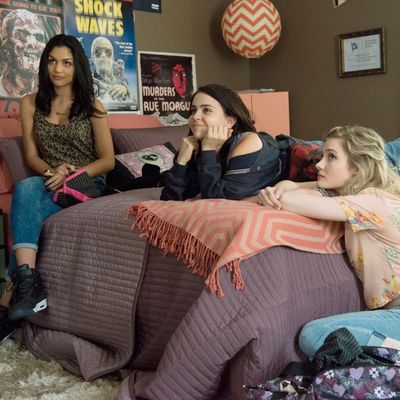
The DUFF dutifully hits almost every entry in the lexicon of modern high-school comedies: Here’s the scene where our narrator playfully lays out the social structure of her school; here’s the boy our heroine likes, who eventually turns out to be Mr. Wrong; here’s the trying-on-different-clothes montage; here’s the neglectful parent, and the clueless principal, and the goofy teacher; here’s the homecoming dance, where previously ironclad social roles get upended. So why is it so wonderful? Because wit and charm matter, and The DUFF has a good deal of both. The cast will be stars, the gags will be immortal, and you’ll still be watching this movie years from now.
That said, the premise of the story itself is a nasty bit of business. Our heroine, Bianca (Mae Whitman), part of a trio of longtime best friends, discovers one day that she might be the “DUFF” in this relationship: the Designated Ugly Fat Friend — the approachable, schlumpy gatekeeper to her otherwise hot, intimidating pals. Never mind that her friends — kind, aspiring fashionista Jess (Skyler Samuels) and vivacious athlete Casey (Bianca Santos) — always treat her as an equal. And never mind the fact that Bianca herself is beautiful, funny, and smart. This is the paranoid, insecure teenage mind we’re talking about here! And so, after this discovery, Bianca rejects her friends and practically gives up on life. But then, her hunky football-captain neighbor Wesley (Robbie Amell) agrees to help her overcome her DUFF-ness, in exchange for help with chemistry. Of course, Robbie was the one who told Bianca about the whole DUFF thing in the first place, so he feels he needs to make things up to her. He also feels bad because he’s clearly attracted to her, though his social status and his nasty, preening ex-girlfriend (Bella Thorne) prevent him from acting on the impulse.
Anyway, you know where it’s all headed. Actually, you knew where it was all headed from the first frame, or maybe even the first poster. But director Ari Sandel (who, amazingly, has an Oscar, for a great short musical he made some years ago called West Bank Story) makes sure the film never takes itself too seriously. Or rather, the film doesn’t take its story too seriously, but it does take its characters very seriously. The remarkably inventive Mae Whitman, whom you might recognize from Arrested Development and Parenthood, turns Bianca into a winning guide to her own social meltdown and resurrection. The part calls for her to be offbeat and sassy and vulnerable, delivering irreverent asides and goofy slapstick and lovesick doe eyes and inner torment — remember, this is a movie largely about a state of mind — with speed and ease. And she nails it. She’s also got great chemistry with Robbie Amell, playing her hunky romantic foil. He’s got killer Tom Cruise looks, but he combines that with physical ease and a gentleness of demeanor. Even though he’s first seen as something of a buffoonish jock, Wesley’s fondness for Bianca feels real, and you know it’s all going to turn out okay.
In the end, that’s what impressed me most about The DUFF. A lot of high-school movies turn on suspicion and sarcasm, with everybody constantly sizing up and sneering at everyone else. These films create worlds that, for all their candy-colored pop textures, are deeply unpleasant. The DUFF has a bit of that — it has to, with that story premise — but the likable cast and their surprising exchanges create an atmosphere of acceptance and affection. Bianca turns on her friends when she imagines that the world has turned on her. But the film itself doesn’t quite go in that direction. There’s a gentleness underlying the sharp barbs and broad slapstick that feels genuine and unique. It’s a world that, for all its social horrors, I can’t wait to revisit.


